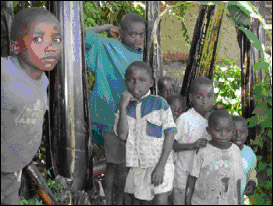 Family
Life Family
Life |
After Rwanda's civil war, many Rwandans lived in
tents in resettlement camps that were protected
by foreign peacekeepers, and others fled to refugee
camps in neighbouring countries. During the war,
homesteads were destroyed, families were torn apart,
and thousands of children were orphaned. Today,
some refugees are returning from other countries,
including people who left Rwanda in 1959, and villages
are being resettled. However, it will take many
years to rebuild Rwandan society.

A rugo (traditional Rwandan homestead) consists
of several beehive-shaped houses within a larger,
fenced compound. The main family house is in the
middle. Each house is made of woven branches and
grasses, covered with clay. There is no running
water, so women and children fetch water for the
household every day. In cities, there is some Western-style
housing, but most urban Rwandans live in small mud-walled
houses with corrugated iron roofs. |

The term inzu in Kinyarwanda can mean family, household
or house. An inzu usually consists of a husband
and wife, children and close relatives. A family
without children is considered incomplete, and large
families are common. People from several inzus who
can trace their origins to a common male ancestor
form a kinship unit called a umuryango. The oldest
and most influential male in this group is the umukungu,
the head of the umuryango.
It is expected that all Rwandans will marry. Only
about one in 200 women reaches the age of 50 without
marrying. Before a marriage can take place, the
groom's family must pay a bride-price, usually a
cow, to the bride's father. If the partners wish,
a marriage can be dissolved, but the bride-price
must be returned to the groom's family. In recent
times, Rwandan men and women have been getting married
later in life, because of a lack of money to pay
the bride-price and the shortage of land to set
up a new household. |

